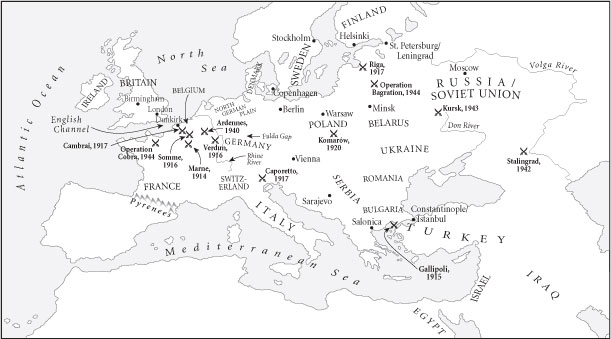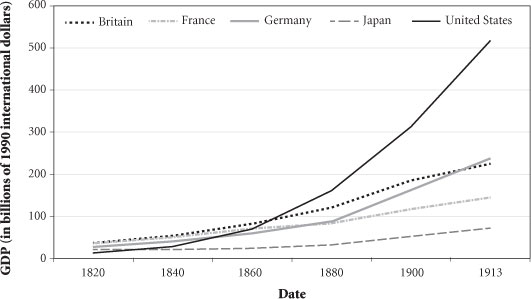Read War: What is it good for? Online
Authors: Ian Morris
War: What is it good for? (40 page)
5

STORM OF STEEL: THE WAR FOR EUROPE, 1914â1980s
Cosmos into Chaos
The
Daily Mail
has never been the mouthpiece of Britain's chattering classes (“produced by office-boys for office-boys,” one prime minister acidly remarked around 1900), but a century ago it was the country's bestselling broadsheet, and Norman Angellâits Paris editorâwas a man accustomed to being listened to. Even he, though, was astonished at the success of his book
The Great Illusion
when it appeared in 1910.
Angell was a character. After abandoning an expensive Swiss boarding school at seventeen, he had run off to California, where he tried his luck at pig-farming, ditch-digging, cattle-ranching, and mail-carrying. But then he drifted back to Europe, and now, approaching respectable middle age, he turned more Kantian than Kant himself. Updating
Perpetual Peace
for the twentieth century, he asked: “What is the real guarantee of good behaviour of one state to another?” His answer: “It is the elaborate interdependence which, not only in the economic sense, but in every sense, makes an unwarrantable aggression of one state upon another react upon the interests of the aggressor.” War, he concluded, had put itself out of business. “The day for progress by force has passed,” he pronounced; from now on, “it will be progress by ideas or not at all.”
Angell joined the long list of prophets with terrible timing. In 1914, the same politicians who had praised his book and attended the Hague peace conferences set off World War I, and over the next four years they killed fifteen million people. The civil wars that dragged on for another four years
killed another twenty million, and between 1939 and 1945 the greatest war of all killed fifty to a hundred million more. Angell was perhaps the worst prophet ever.
But then again ⦠if Angell could have come back a century after he wrote, he might have claimed to be the
best
prophet of all time. In 2010 the planet was more peaceful and prosperous than ever before. The risk of violent death had fallen well below one in a hundred (in western Europe, below one in three thousand). People typically lived twice as long, ate well enough to grow four inches taller, and earned four times as much as their great-grandparents had in 1910.
The twentieth century was the best of times and it was the worst of times, what the great historian Eric Hobsbawm called an “age of extremes,” combining the bloodiest war ever fought with the greatest peace ever known. Angell went on writing books for another forty years after
The Great Illusion
came out but never really did explain this paradox.
The easiest way out of the conundrum, which Angell sometimes took, was to insist that the big story was that the world really was going the way he (and Kant) had said, but that bad luck had intervened. Given the way the First World War began, in an absolute avalanche of bad luck, this seemed rather reasonable. If Austria's Archduke Franz Ferdinand had just decided not to go to Sarajevo on June 28, 1914 (
Figure 5.1
), he would not have been murdered, Austria would not have declared war on Serbia, and Russia, Germany, France, and Britain would have stayed at peace too. Or if the head of Austrian security that day had not published the archduke's route through Sarajevo in advance, let him ride in an open-topped car going at ten miles an hour, and refused to have any of the seventy thousand troops on maneuvers nearby serve as security details because their uniforms would be dirty, the terrorist plot would surely have failed. If the security chief had not then forgotten to tell the drivers of the first two cars in the archduke's convoy about a change in the route; if he had not stopped them and had the whole convoy back up, so that it was moving even slower as it passed the assassin Gavrilo Princip; if he had put the archduke's bodyguard on the side of the car facing the crowd, rather than the side facing the empty road; if another Serb had not attacked the policeman who grabbed Princip's hand as he pulled his revolver ⦠if any of these things had gone differently, there would have been no July Crisis. The Guns of August would not have fired. And come December, a million young men would still have been alive. Accident has a lot to answer for.

Figure 5.1. The great wars: the fight for Europe, 1910sâ1980s
When the war was over, the politicians who had led their people into it
embraced this argument, rushing to reassure readers that the catastrophe had not been their fault. “The nations in 1914 slithered over the brink into the boiling cauldron of war without any trace of apprehension or dismay,” Britain's wartime prime minister, David Lloyd George, claimed in his memoirs. Going one better, Winston Churchill (first lord of the Admiralty in 1914) suggested that the war had been a force of nature, beyond anyone's control. “One must think of the intercourse of nations in those days,” he wrote in 1922,
as prodigious organizations of forces active or latent which, like planetary bodies, could not approach each other in space without giving rise to profound magnetic reactions. If they got too near, the lightnings would begin to flash, and beyond a certain point they might be attracted altogether from the orbits in which they were restrained ⦠and plunge Cosmos into Chaos.
And yet the letters, diaries, and cabinet minutes that politicians actually wrote during the doomed summer of 1914 reveal something entirely different. Europe's leaders were not slithering, sliding, or suffering from magnetic attraction. In reality, they coldly, calmly, and with all due calculation considered the risks and, one after another, concluded that war was their best option. Even after it was clear what the costs of war would be, more
countries kept coming inâTurkey late in 1914, Italy and Bulgaria in 1915, Romania in 1916, and the United States in 1917. And in 1939, with no illusions left at all, the politicians condemned tens of millions more to death.
Should we conclude that all these politicians, with all their years of education and experience, were in fact fools, so blinded by irrational fears and hatreds that they could not see where their peoples' best interests lay? Judging from the number of books with titles like
The March of Folly,
many historians would answer yes. But this is superficial: the twentieth century's leaders were neither wiser nor more foolish than those of other ages, neither more nor less predisposed to think that force would solve their problems than the men we met in
Chapters 1
â
4
. The reason that the last century combined such violence with such peace and prosperity was that the legacy of the Five Hundred Years' War was more complicated than Angellâand many writers since his timeârealized.
Unknown Unknowns
“When constabulary duty's to be done, to be done,” the chorus sings in Gilbert and Sullivan's comic opera
The Pirates of Penzance,
“a policeman's lot is not an 'appy one.” Audiences hooted with laughter when the show first went onstage in 1879, but the masters of the world-system were perhaps not amused.
For two generations, Britain had (usually) been willing and able to play globocop because, as late as 1860, it was the only truly industrialized economy on earth. British factories turned out better, cheaper goods than anyone else's, and so long as the seas were safe for free trade, these could always find buyers. Britons could then use their profits to purchase food wherever it was best and cheapest, and the farmers selling the food could use the profits from these sales to buy more British goods, allowing the British to buy more food ⦠and so on. Britain had the money to play globocop, and needed to play globocop to keep making money.
Everyone involved prospered, but Britain prospered most of all. Its gross domestic product (GDP) almost tripled between 1820 and 1870, increasing from 5 percent to 9 percent of the world's total (today it is 3 percent). Ships and bases to keep the sea-lanes open cost money, but the British economy grew so fast that they seemed like a bargain, costing just sixpence out of every pound of wealth being producedâless than 3 percent of GDP.
By the 1870s, though, Britain was finding constabulary duty less happy, not because it was doing it badly, but because it was doing it too well. As
British profits accumulated, the same free trade that allowed Britain to prosper also allowed the country's capitalists to invest their surplus wealth wherever it promised to bring the highest returnsâwhich, much of the time, meant financing industrial revolutions in other countries. Relying heavily on British loans (often using British money to buy British machines that could produce goods that would compete with British exports), a string of countries industrialized after 1870. That Britain's ancient rival France would go this way surprised no one, but civil wars in the United States (1861â65) and Japan (1864â68) and wars of unification in Germany (1864â71) also produced centralized governments that aggressively pursued industrialization (
Figure 5.2
). In 1880, Britain still accounted for 23 percent of the world's manufacturing and trade, but by 1913 this had fallen to 14 percent.

Figure 5.2. Dark satanic mills: industrial output per person in five major economies, 1750â1913 (Britain's output in 1900 is treated as 100 points)
In purely economic terms, this was in fact good for Britain, because as the world industrialized, the pie got bigger. Fourteen percent of the world's manufacturing and trade in 1913 added up to a lot more than 23 percent in 1870. Further, Britain was moving up the value chain. It had shifted from agriculture toward more profitable industries after the 1780s, and in the 1870s it shifted again, abandoning investment in industry for greater profits from services (particularly banking, shipping, insurance, and foreign loans). Britain's GDP more than doubled between 1870 and 1913, and with all this extra wealth Britain (and other industrializing nations) could afford
to expand its open-access order aggressively. Germany led the way, introducing health insurance and old-age pensions for workers in the 1880s, and by 1913 most industrialized nations had followed. Free primary education, universal male suffrage, and eventually votes for women became the norm.
Strategically, though, the economic triumph was a disaster for Britain, because its strategy, much like the strategies of the ancient empires seventeen centuries earlier, had overshot its culminating point. The United States' economy outgrew Britain's in 1872, and in 1901 so did Germany's (
Figure 5.3
). Every newly wealthy government now built a modern fleet to project its power and prestige. Britain stayed in front, more than quadrupling the size and firepower of its navy between 1880 and 1914, but its share of global gunnery nonetheless declined (
Figure 5.4
). The globocop could take on any plausible combination of enemies but could no longer intimidate everyone at once.

Figure 5.3. The rise of the rest: the size of five major industrial economies, 1820â1913